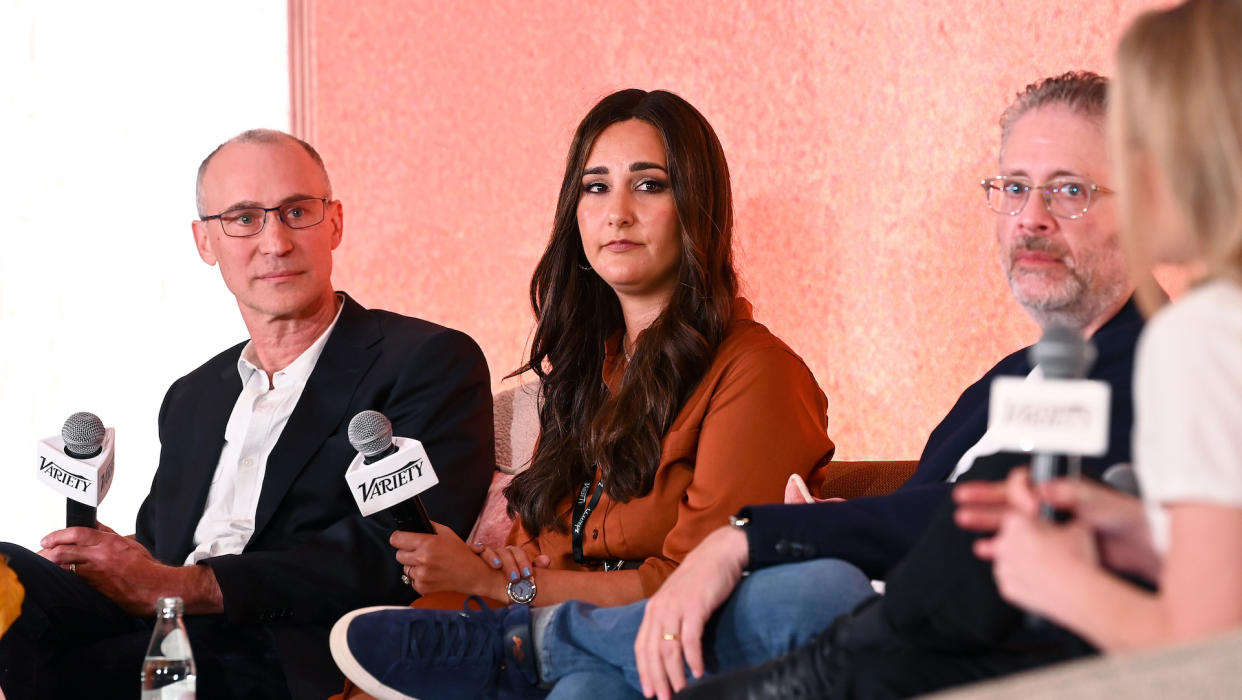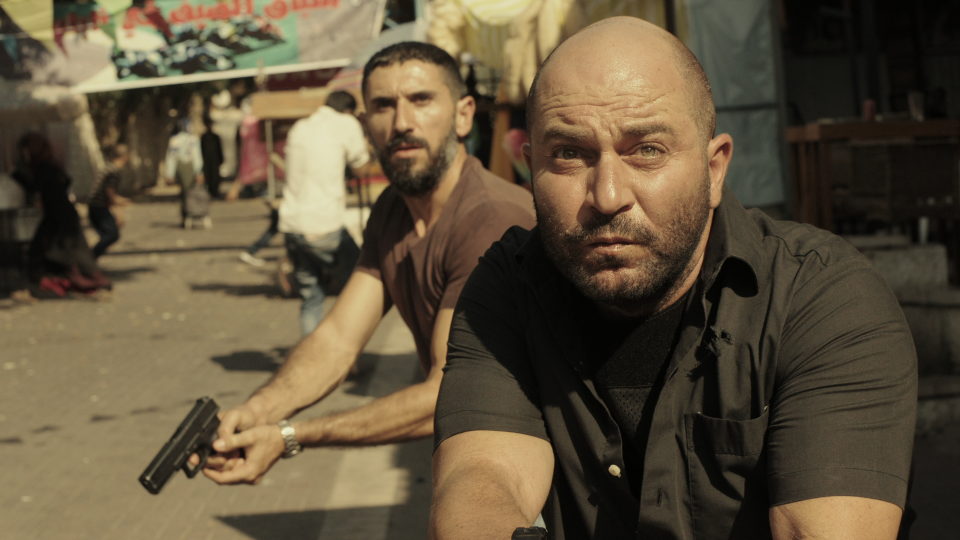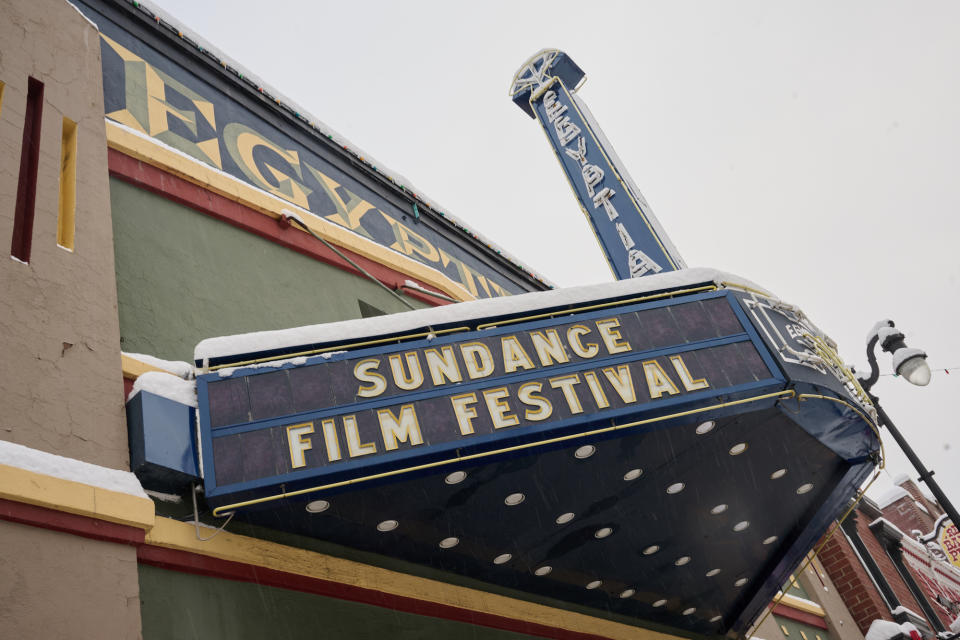An Israeli Representation Panel and a Palestinian Solidarity March Will Hit Sundance at the Same Time

On Sunday, January 21, in Park City, nonprofit organization Jew in the City is hosting a panel discussion at Sundance that aims to debunk what it says are tropes about Jewish people and Israel in the media. Just across town, shortly after that panel begins, a group of protestors will gather to show their solidarity for Palestinians.
The panel discussion kicks off at 11:30 a.m. MT at The Box at The Ray Theatre; the protest begins around noon in front of the Filmmaker Lodge on Main Street. Both sides say the timing is a coincidence, but after more than 100 days of conflict in Gaza after Hamas’ October 7 attack on Israel, the two events represent a microcosm of the debate and political fervor that has defined Israel and Palestine for a millennia.
More from IndieWire
The First Weekend of the 2024 Sundance Film Festival Saw the Debut of a New Wave of Oscar Contenders
The Jew in the City panel (“Sects, Lies, and Videotape: Debunking Deadly Tropes About Jews and Israel in TV, Film, and Media”) wants to take on the taboo topic of Jewish racial dynamics and break down the “lies” in the media about whiteness and power, ideas the panelists will argue have been bolstered by Hollywood. The panel features pro-Israel activist Noa Tishby speaking alongside Jew in the City founder Allison Josephs and moderator Malina Saval.
The “Let Gaza Live” protest also has a bone to pick with the media, accusing it of being complicit in refusing to call Israel’s attacks in Gaza genocide or in refusing to mention Palestine when discussing Israel and Hamas.
IndieWire spoke with organizers for each event. Both state their intentions as advancing representation, ending hate, and calling for peace. Although the events were planned independently of each other, they’ve each sparked outrage from both sides of the divide.
The Jew in the City panel represents the group’s return to Park City after last year’s panel “#MeJew: Antisemitism, Authentic Representation, and Jewish Identity in Hollywood.” That panel was standing room only, and the new one could also be a hot ticket.
Both last year’s panel and the upcoming one are partner events that are not organized or curated by Sundance itself. A Sundance rep said partners with any event must follow the Sundance Film Festival community agreement and be “advocates for independent storytelling and elevators of diverse voices within our industry.”
Last year’s panel focused on Hollywood’s history and founding by Jewish people, antisemitism, and why Jews should be part of discussions around diversity, equity, and inclusion. This year will delve into genetics, whiteness, and the power that culture assigns to them.
Josephs said the panel is about “setting the record straight about who Jews are, who Israel is, and how these lies are amplified in media,” with the goal of normalizing Jews and Israelis in culture.
“I read about a white-passing Black woman who wrote, ‘This isn’t privilege that I look like this. I look like this because my great great grandmother was raped by her slave master.’ And I was like, ‘Oh my God! We never tell the Ashkenazi Jewish story this way,'” said Josephs. “There was a lot of violence done to our foremothers. If that’s how other communities are talking about how their white-passing members should be considered, why shouldn’t Jewish people also be able to share that story?”
According to the January 21 panel announcement, “‘white Europeans’ is a neo-Nazi canard that has shockingly been bolstered in Hollywood.” Josephs, who identifies as an Orthodox, Ashkenazi Jew, said a white supremacist conspiracy theory believes Ashkenazi Jews are disconnected from Israel and are not “real” Jews.
“It’s a very strange thing because on one hand, we’re non-white to them. We’re not white enough, we’re this sub-human race,” she said. “On the other hand, there’s this obsession with disconnecting the Jewish connection to the land of Israel. It doesn’t make sense, because these people are morons, but that’s what we’re dealing with. And the crazy thing is that you have several TV shows and films made by Hollywood that seem to amplify the whiteness of Jews.”
But that framing didn’t sit well with some voices online.
“I think it’s extremely important that we as a film community dissect and dismantle antisemitic tropes in media. But to frame this dialog as interchangeable with criticism of Israel is dangerous and dishonest,” Dara Messinger, director of programming with DCTV in New York told IndieWire after criticizing the panel on X.

Josephs says the media is often too quick to vilify Israel, and in a statement she responded to some of the criticism of the panel description’s claim that Hollywood advances a neo-Nazi talking point.
“Anti-Zionism is antisemitism according to the IHRA definition — the most accepted version — of antisemitism. Any Jew that has faced hatred for their connection to their ancestral homeland can attest to the fact that Anti-Zionism is antisemitism,” Josephs said. “Critiquing Israel is allowed. Critiquing any country is allowed. It turns into antisemitism when there are the three Ds — demonization, delegitimization, double standard. The folks on X seem to be doing all of that. It reinforces the importance of our panel, which will help people spot blood libels in film and media at large and show why the whitewashing of the Jewish people and tropes of Jewish power are so dangerous.”
The Palestinian protest stemmed from a collective of Palestinian support groups around Salt Lake City that started their planning before Sundance unveiled its lineup of partner events and targeted Sundance as a way to attract additional media attention to their cause. It expects 100-200 attendees.
Ambreen Khan, a Pakistani leader with member group Healthcare Workers for Palestine, said they were unaware of the Jew in the City panel when they chose the date. However, the decision to host it on Main Street away from The Ray was a conscious choice to focus on Palestinian voices and give others a chance to be heard.
Khan said the group has no issue with Sundance itself and specifically chose not to protest in front of the Egyptian Theatre to avoid disrupting the festival premieres. Sundance is aware of the protest, Khan said, and that the group does not require a permit so long as the protest does not block traffic or pedestrians. The demonstration will also include speeches and performances, which could include re-enactments of scenes from Gaza. Khan says it will be a peaceful protest and the collective recruited its own security from a group called Armed Queers.
“Our goal is to call the media out for reporting biases that it has had on this topic, specifically things like avoiding calling this a genocide or avoiding using even Palestine when reporting or under-representing the numbers of people that show up,” Khan said.

Jew in the City panel moderator Malina Saval commented on the protest’s Instagram post: “Will anybody be calling out Hamas, an Iran-backed terrorist regime that rapes and murders and slaughters its own people? Will there be actual support of the Palestinian people or is this just a gathering of Jew haters,” Saval wrote. “I’ll be moderating an event Sunday at Sundance at 11:30 am with Noa Tishby and Allison Josephs about the danger of Jewish blood libels and antisemitic tropes it’s anybody wants to come and actually help spread peace. If not, enjoy cheering on the terrorists. They’re coming to America next. Get ready.”
Khan described Saval’s post as “inflammatory” rhetoric.
“I think that takes the focus away from the cause. We are not against Jewish people,” Khan said. “We are against the state of Israel, and we are against what the state of Israel is doing to the Palestinians, and if we try and engage with people who are so far on the other side of what we believe in, then we are not centering the voices of Palestinians. That’s really the end goal here. It’s not to escalate things. It is not to cause issues with people who feel extremely differently than we do.”
Khan added that Saval’s comments about terrorists “coming to America next” can make those who are immigrants or refugees “feel unwelcome in this country.”
Saval, who is on the board for Jew in the City’s Hollywood Bureau and is a editor in chief with Pasadena Magazine and staff writer at Los Angeles Magazine (Saval previously wrote for Variety, which is owned by IndieWire’s parent company PMC) spoke with IndieWire and stood by her remarks. However, she clarified that her issue is with Hamas, not Palestinians or Muslims. She pushed back on the idea that it would be inflammatory to see Hamas as anything but a terrorist organization and said “it’s not genocide to defend one’s country” from terrorist attacks like the one on Oct 7.
“Let’s have a conversation about it. We’re more than happy to have her and everyone there,” Saval said. “And I meant what I said: Will there be any conversation about what’s best for the Palestinians? Because I think any rational human being would believe, would know that what’s best for Palestinian culture is not to be ruled and enslaved by a terrorist organization. Palestinians deserve amazing schools. Their children deserve summer camps. They deserve education. They deserve to make a living wage.”
Saval also challenged Khan’s notion that there is a bias in the news media about Muslims and Palestinians, citing a stat from the Anti-Defamation League that says antisemitic incidents in the U.S. have risen 360 percent in the 100+ days since the Oct. 7 attack. But she also welcomed a deeper conversation, wondering why the group would choose to have its demonstration when her panel is taking place.
Added Josephs, “It’s a scary time for a Jewish person to go to any Jewish institution, to wear any Jewish article of clothing. As Orthodox Jews, we feel as acutely because we are going to Jewish schools, kosher stores, synagogues multiple times a day. But I will tell you that I am concerned, and I am hoping that the Sundance infrastructure will be able to keep us both physically and psychologically safe.”
Best of IndieWire
The Best LGBTQ Movies and TV Shows Streaming on Netflix Right Now
Guillermo del Toro's Favorite Movies: 54 Films the Director Wants You to See
Nicolas Winding Refn's Favorite Films: 37 Movies the Director Wants You to See
Sign up for Indiewire's Newsletter. For the latest news, follow us on Facebook, Twitter, and Instagram.

